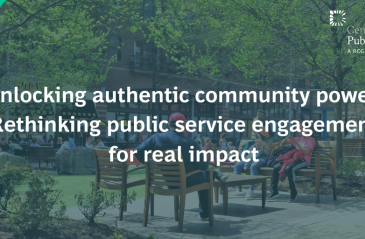
The power of storytelling in climate leadership

Putting a clear plan to the electorate brings legitimacy
Share articleIt's crucial to have a civil service that is capable of delivering what you need
Share articlePeople who leave everything behind and move to the city are what helps make cities special
Share articleWe put our vision for government into practice through learning partner projects that align with our values and help reimagine government so that it works for everyone.
Patricia de Lille makes an alarming admission when I meet her in her office in the shadow of Table Mountain. “I hate meetings,” she explains, “they are good for keeping minutes but otherwise they are a waste of time.” And in a single sentence, the mayor of Cape Town sums up her philosophy. Focused on results, straight talking and with little time for bureaucracy, she's shaken up a city that is one of the most multicultural, and dynamic, on the planet.
“How do you make a great city even greater?” she asks, echoing the theme of her 2011 mayoral election campaign. With 61% of the vote she achieved a comfortable majority in support of her answer to that question.
Her vision was based on some familiar mayoral themes such as job creation, infrastructure investment and public safety but also included a pledge about government efficiency, so that “people know that the government works for them, in partnership with them”. More recently, inspired by Mayor Bloomberg's 2011 pledge to make New York the first digital city in America, Mayor de Lille has pledged to make Cape Town the first digital city in Africa.
“Putting a clear plan to the electorate is important,” she explains, “it brings legitimacy and ensures everyone shares the vision.”
On assuming office four years ago, she was under no illusions about the scale of the transformation she sought from the city's 27,000 officials. “When I came to office I inherited a structure that had done the same things for 30 years, often quite badly. There were people working here who hadn't worked anywhere else, having been in the same job for 40 years.”
Such a description would never be applied to de Lille, however. A trade unionist and the first woman to be elected vice president of the National Council of Trade Unions, she became a member of parliament in 1994, where former President Mandela appointed her as the Chairperson of the Portfolio Committee on Transport. In 2003, she went on to become the first female member of parliament to form her own political party in a democratic South Africa, and won seats at national, provincial and local level.
A key aspect of her mayoral approach stems from the experiences of Singapore. Its success inspired the introduction of a performance management system that doesn't flinch from tackling poor performance, in the face of some resistance. “It took us three years to really make progress on that,” she explains, “but it's vitally important to have a civil service that is capable of delivering what you need. It's a real paradigm shift.”
De Lille was clear that, to be successful, she needed to connect her vision and strategy for the city to a coherent set of policies and an implementation structure. Inspired by Michael Barber's book, ‘Instruction to Deliver', which described his experiences establishing the Prime Minister's Delivery Unit for Tony Blair, she established a small Strategic Policy Unit to drive implementation. As a result, a new focus on outcomes rather than ‘tick box outputs' was established.
At the same time, de Lille turned her attention to the wider structures of the city administration. “Like most governments around the world it was very silo-based,” she explains. This made genuinely joined-up government near impossible and allowed problems created by one department to spill over into other policy areas. “Over three years we introduced a transversal management system, which helped create a more joined-up approach as well as eliminating waste caused by duplication and poor decision-making.”
These reforms included the introduction of a social policy cluster and an economic policy cluster, which, as de Lille explains, are two sides of the same coin. “If you want to deal with social issues you need to grow the economy, and vice versa.” The two clusters, overseen by the mayor and deputy mayor directly, are brought together every six months to ensure that policy coherence is maintained.
Like every city administration, Cape Town finds itself beneath higher levels of government, in this case both at the national and provincial levels, but Mayor de Lille is in no doubt which she sees as being in the ascendancy. “Cities are the catalyst of change,” she explains. “Today, for the first time in the history of civilisation, more people are living in cities than in rural areas. The kind of person that is willing to leave everything behind and move to the city is a special kind of person and that's what helps make cities special.”
Cities can also learn from one another and collaborate in a way that countries find more difficult. As an example, Mayor de Lille cites the C40 initiative - a network of the world's megacities taking action to reduce greenhouse gas emissions, which was founded by Ken Livingstone when he was mayor of London. As well as Bloomberg in New York, she also mentions Governor O'Malley, the former mayor of Baltimore who pioneered a more data-driven approach, as a source of inspiration.
But perhaps the most important factor in a city's favour is the role of mayor itself. Directly elected, with a mandate from the city's population, the public impact they can achieve seek is far more proximate than that of national presidents or prime ministers.











